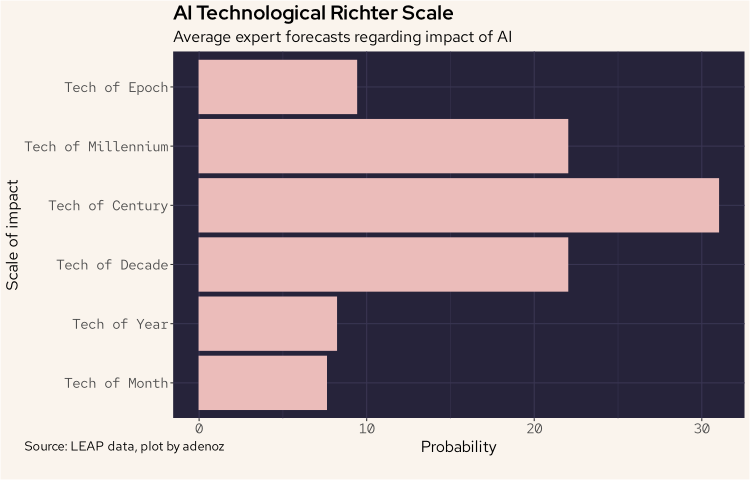📆 2025-11-12
Taking a LEAP with forecasting the future of AI
⌛ Reading time: 6 minAs the definitive saying goes:
Prediction is very difficult, especially when it's about the future.
Niels Bohr, 20th century physicist, quoted circa 1962.
A variation of the above quote was later reportedly used by Mark Twain, and US President Eisenhower once remarked 'The future lies before us'.
Even today, with all of the advances in technology, mathematics, data science and civilisation, prediction and forecasting remains fraught.
Is something even forecastable?
Using data-driven approaches to predictions and forecasting automatically implies that the future is in some way related to the past and some extrapolation is expected. It also implies that the causes and / or predictors of change are able to be collected as data points in a reliable manner.
Some things can be predicted, and some really can't. Hyndman and Athanasopoulos list four factors that contribute to how predictable something is:
- how well we understand the factors that contribute to it,
- how much data is available,
- how similar the future is to the past, and
- whether the forecasts can affect the thing we are trying to forecast.
But what if the above factors are not present to a sufficient degree, like if we wanted to forecast how the capabilities and use of AI will progress into the future? What if we know that the future is heavily impacted by very recent events and there is not enough data to train models?
Taking a LEAP into the trajectory of AI
While we may not have the data we would like, one approach well utilised in social science is to conduct detailed in-depth qualitative surveys. And this is exactly the endevour that the Longitudinal Expert AI Panel (LEAP) is undertaking in its efforts to coordinate broad and deep surveys regarding the trajectory of AI, over time. On the whole, the effort is to be applauded and some relevant insights are likely to be collected using their approach, which both taps into broad and relevant expertise that harnesses the power of the crowd. The detailed LEAP White Paper is recommended reading for more detail.
Recently LEAP has published it's most recent findings from their third wave of surveys / questions[1]. While there are huge variations in predictions across society regarding the likely capabilities, adoption and impact of AI - spanning moderate increases in productivity through to as impactful as the agricultural revolution - LEAP aims to take a systematic approach through regular surveys of over 300 experts, 'superforecasters' and 'regular' people.
Recent LEAP findings
A small selection from the most recent findings are listed as follows:
- Experts expect sizable near‑term societal effects from AI by 2040.
- Experts disagree and express substantial uncertainty about the trajectory of AI.
- The median expert expects significantly less AI progress than leaders of frontier AI companies.
- Experts predict much faster AI progress than the general public.
- There are few differences in prediction between superforecasters and experts, but, where there is disagreement, experts tend to expect more AI progress.
The recent finding are worth a read in their entirety. It's interesting, and surprising to me, that the experts consisting of computer scientists, AI industry experts, economists and policy / think tank groups mostly tended to agree on matters. One area I'm dissapointed to see is input from AI industry leaders, including CEOs, that everyone knows are incredibly biased. AI industry CEO comments should not be included as they will sway the results to be more inaccurate, and their inclusion impacts the credibility of the entire LEAP effort. Fortunately, there are enough other experts involved to mitigate this concern, though LEAP remains tarnished by CEO involvement.
One key question is just what scale those 'near-term societal effects' will reach, along with what time frame. The detailed write-up does explore this in some detail. While I think some of the categories either miss the mark or are of themselves not important (like amount of AI investment or how much power is used), I do find the bar chart showing the Technological Richter Scale to be interesting. I've reproduced it below in the style of adenoz.

In the above plot, LEAP takes technology of the month to be about the same impact as a great smarthone app, of the year to be the same impact as the VCR, of the decade to be the same impact as credit cards, of the century to be the same impact as electricity, of the millennium to be the same as agriculture and of the epoch to be the same as the rise of humans.
Interestingly, LEAP is predicting that AI will be more likely to be similar to the impact of the rise of human beings than being only as impactful as the VCR. The overall LEAP assessment is that AI is most likely to be a technology of the century and be as impactful as the discovery and use of electricity. That is huge.
I think it is fair to conclude that experts are more aware of the advances being made in AI compared to the general public. However it is also possible that having that knowledge and being more 'inside the bubble' may over-enthuse some expert opinions. If the general public isn't seeing the progression, does it even matter?
The entire LEAP project is worth reading into. Personally, I am particularly interested in future waves when geopolitical topics will be explored however I'll maintain a watch on this effort as the overall approaches, surveying experts and harnessing the power of the crowd, are proven to perform well when executed well.
-
LEAP, which launched in June 2025, has committed to pursuing this study for a period of three years, conducted each month in various waves over time. ↩
📌 Post tags: forecast ai ggplot